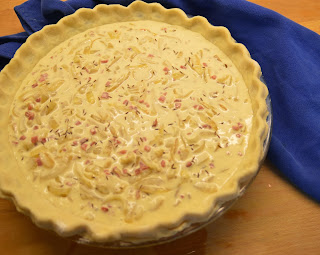So many things happen in Germany in the autumn. Weinfests. Oktoberfests. Leaves molting from green to yellow, amber, brown, and red. A slight chill in the morning air. Best of all, it’s harvest time in the Vineyards. Which means…
It’s Zwiebelkuchen and Neuerwein time! Gets the heart pumping, doesn’t it! Bet if you knew what the hell they are, your heart would pound a hole in your puny chest! Just settle back and leave it to me to keep you informed and well fed.
Just to whet your appetite, sip some Neuerwein, or new wine. It’s also called Federweißer, meaning feather white, from the bits of yeast still floating around. Actually, it’s not new wine, its just headed in that direction. Cloudy and generally 4% alcohol, it’s sweet and slightly bitter, with a hint of natural carbonation from the fermentation. Matter of fact, the Germans only loosely cap it so the carbonation can escape. At this point you’re having a conversation with yourself. You’re not in Germany. You’ve never heard of, let alone tasted Neuerwein, but by golly you’d like to try some!
Leave it to me to come up with a solution. Let me amend that, to ‘leave it to my wife,’ who subs in the kitchen when she is not out working and slaving to support me. Here’s the basic formula from La Cuisine de Chez Moi:
2 parts tonic water
1 part white grape juice
1 part dry white wine
Ok, it’s not exact, but it’s close. Not satisfied? Well, shell out some coin, you cheap bastard, and catch a flight to Germany!
On to the pièce de resistance, zwiebelkuchen, or onion cake. Don’t know why they call it cake, since it’s more of an onion pie. But, whatever you call it, grab a fork! Don’t worry about a napkin; you won’t leave a crumb.
Before I start, here’s a disclaimer: Every German grandmother makes a different version of zwiebelkuchen, so I took liberties, too. In the first place, I prefer a lighter, flakier crust than you find on most commercial zwiebelkuchens, so I used a homemade pie crust. instead of the traditional yeast crust. See video below.
Let’s have a drink and get started!
Preheat the oven to 430ºF (220ºC) ( after the crust comes out of the frig)
Favorite Pie Crust(this will chill for an hour)
2 1/2 Cups all purpose flour
1/2 Teaspoon salt
1 1/2 Cups butter
3-6 Tablespoons of ice water.
Rather than a lengthy explanation, just watch this short (less than 5 min), dynamite video and you’ll be an instant expert. http://allrecipes.com/video/265/how-to-make-pie-crust/
Pie Filling
Note: Before you start on the filling, roll out the pie crust, put it in a pie pan and put it back in the frig while you make the filling.
3 Large onions, peeled, quartered, and thinly sliced
1 Cup raw bacon, diced
2 Cups Crème Frâiche
4 Eggs
Pepper
Nutmeg
Caraway seeds
Cook the onions on low heat, in a large skillet. You want them translucent, not caramelized. About 15-20 minutes.
 |
| When cooked the onions will reduce to about half this amount |
Remove the onions and add the bacon to the skillet. Cook until crispy. Mix the onions and bacon in a bowl. In another bowl, mix the crème frâiche, eggs, gratings of nutmeg and pepper. When the onion mixture has cooled, mix it with the egg mixture. Pour it into the prepared pie pan. Sprinkle on a few caraway seeds.
Slide the pie into the preheated oven and bake for 40-50 minutes. Check it at the 30 minute point and if the crust is browning too rapidly, cover the pie with a sheet of aluminum foil.
You may have guessed that Zwiebelkuchen is very similar to Quiche. No secret there. Both come from roughly the same area. Lorraine is now France, but has bounced back and forth, so a lot of recipes traveled.
Besides a flaky crust, another peeve of mine is an egg dish that tastes too eggy. If I want scrambled eggs, I’ll make ‘em. This recipe for Zwiebelkuchen is light and fluffy, without a hint of heavy egg flavor.
Now, quit dallying, pour yourself another Federweißer, and get to work!



